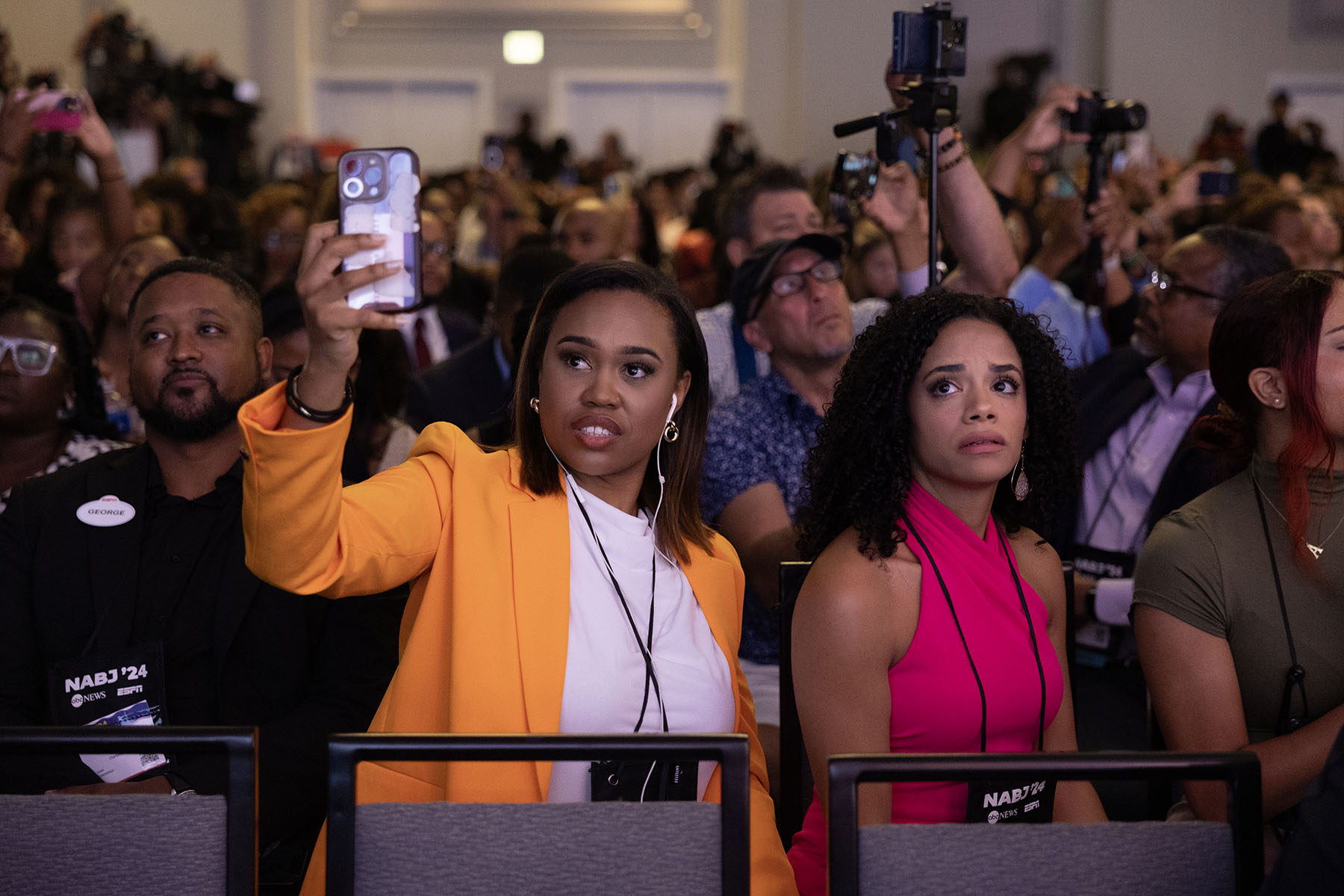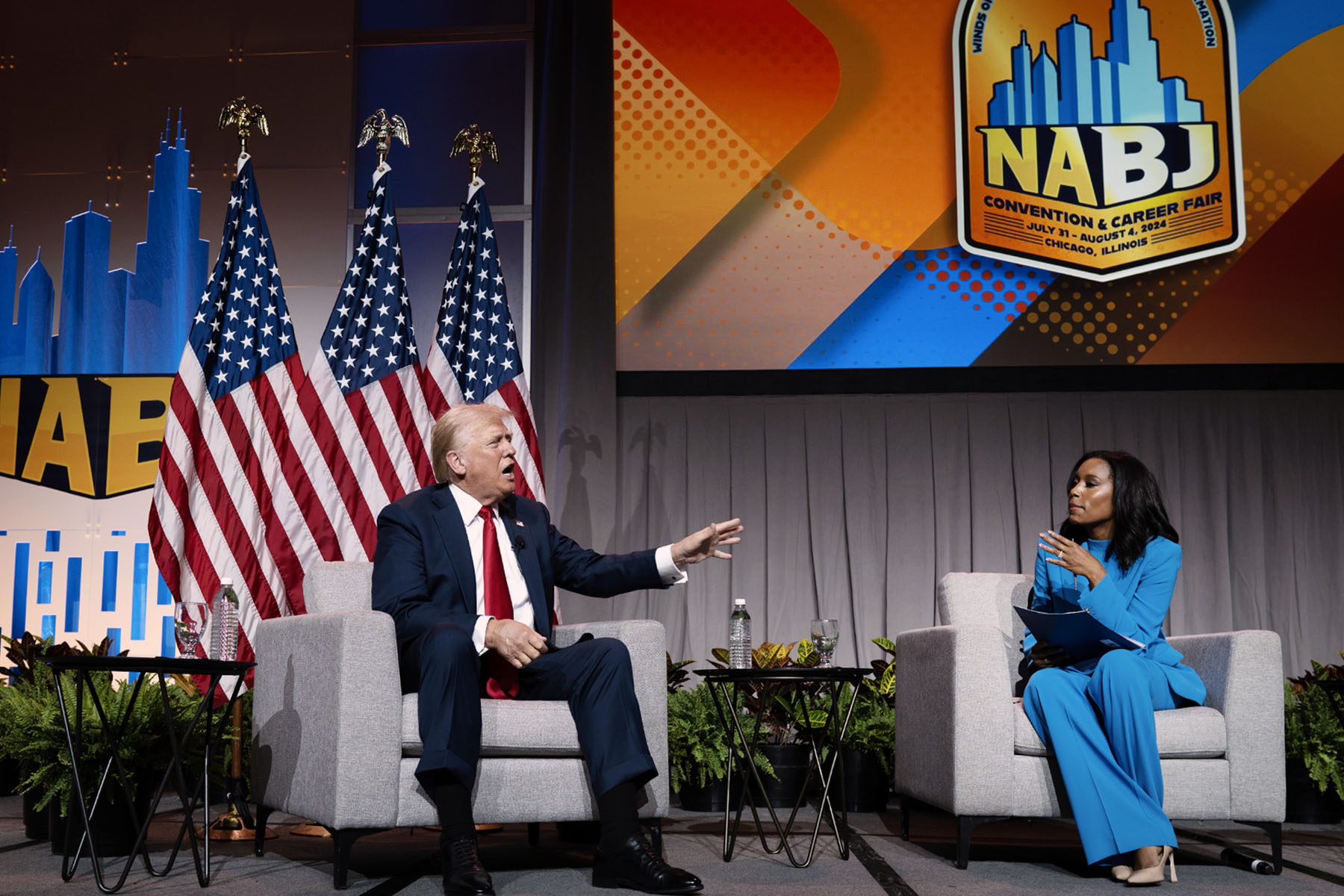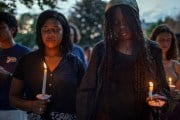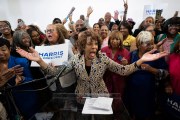Your trusted source for contextualizing Election 2024 news. Sign up for our daily newsletter.
CHICAGO — In a live interview with Black journalists during an event in Chicago on Wednesday, Republican presidential nominee Donald Trump repeatedly insulted one of the moderators, and questioned Vice President Kamala Harris’ racial identity. Trump also said he “didn’t like” what he saw surrounding the police killing of Sonya Massey, but did not outright condemn the officer’s conduct.
The panel took place on the first day of the National Association of Black Journalists’ (NABJ) convention, an annual gathering of journalists from around the country. The event was moderated by three Black women journalists, and featured a combative and defensive Trump.
Trump launched several attacks against Harris, the presumptive Democratic nominee for president, previewing a bitter campaign leading up to the November election.
Trump was asked about comments by several Republican members of Congress claiming that Harris was a “DEI hire” to the administration, an insult Republican leaders have lobbed at women and people of color in positions of power to suggest that they are not qualified for their jobs. The attacks are part of a broader effort by conservatives to push back against policies encouraging diversity, equity and inclusion across American organizations.
When asked if he “believed Harris was a ‘DEI hire,’” the former president said, “Could be, could be?”
Trump also falsely claimed that Harris, who is of Indian and Black heritage, didn’t always identify as Black. “She was always of Indian heritage, and she was only promoting Indian heritage. I didn’t know she was Black until a number of years ago, when she happened to turn Black, and now she wants to be known as Black. So I don’t know, is she Indian, or is she Black?” Trump said.
-
Analysis:
Reporting going back to Harris’ first campaign in 2003 for San Francisco District Attorney shows Harris embraced her historic win as the first Black woman district attorney in state history. Harris is also a graduate of Howard University, a historically Black institution where she pledged the nation’s first Black sorority, Alpha Kappa Alpha Sorority, Inc.
Trump later falsely claimed that Harris, formerly the California attorney general, had not passed her bar exam, a requirement to practice law. “She didn’t pass her law exam, so maybe she wouldn’t pass the cognitive test,” said Trump, after being asked if he would consider taking a cognitive test and making the results public. Harris failed her first attempt at the bar exam but later succeeded and was admitted to the California bar in 1990.
The wide-ranging interview also saw Trump directly attack one of the journalists on stage, Rachel Scott of ABC News. At the top of the event, Trump said Scott’s question was asked in a “horrible manner.” The event started late for reasons that were not immediately clear; Trump went on to accuse Scott of holding up the event, and blamed her for technical issues around the event’s audio, despite Scott having no role related to the event’s sound.
Trump twice used the word “nasty” to refer to Scott’s questioning, recalling Trump’s “nasty woman” attack against Hillary Clinton. At one point he said he was “treated so rudely by this woman,” prompting another moderator, Harris Faulkner of Fox News to exclaim, “Oh my goodness.”

The exchanges were also reminiscent of the former president’s often tense relationship with Black women reporters during his years in the White House.
When asked about the police killing of 36-year-old Massey, a Black mother in Illinois, Trump responded that he did not know specifics about the case, but “it didn’t look good to me.” Some audience members audibly groaned in response.
Massey had called police in the early morning of July 6 because she was concerned about a potential intruder outside her home. Police body camera footage attracted nationwide attention to the case, showing Massey speaking with two deputies before the exchange escalated and both officers drew their weapons. Ultimately, one of the deputies fatally shot her while she was standing in her kitchen.
Wednesday was the first time Trump publicly weighed in on the incident.
The case has drawn public condemnation from the public, politicians and celebrities. For Black women in particular, it underscores the threats of violence they face both from potential perpetrators in addition to those tasked with protecting the public. The day after the police camera footage went viral, Harris released an official statement that was critical of the officer’s conduct.
“Sonya Massey deserved to be safe. After she called the police for help, she was tragically killed in her own home at the hands of a responding officer sworn to protect and serve,” she stated. “Doug and I send strength and prayers to Sonya’s family and friends, and we join them in grieving her senseless death.”
During the panel, Semafor reporter Kadia Goba questioned Trump about past comments promising to give the police immunity from prosecution. Goba asked why a member of law enforcement like the one who shot Massey should be granted immunity.
Rather than answer Goba’s questions, he pivoted to talking about gun violence in Chicago.
“Nobody wants that. We need to have our police officers have the respect and dignity back,” he said.
-
Read Next:
NABJ’s invitation to Trump quickly gained criticism from members after it was announced Monday night. Members also noted that Harris would not be present, heightening tensions. A day after the announcement, convention co-chair Karen Attiah stepped down from her position.
“While my decision was influenced by a variety of factors, I was not involved or consulted with in any way with the decision to platform Trump in such a format,” Attiah wrote on X.
Femi Redwood, chair of NABJ’s LGBTQ+ Task Force, expressed disappointment that “in a space where so many queer and trans members still feel vulnerable will now feel even more unsafe due to Trump being invited and the possibility of his most vicious followers coming to the hotel to support him.”
Multiple panelists, including trans author and activist Raquel Willis, canceled their scheduled appearances at the convention in protest.
In response, NABJ President Ken Lemon released a statement sharing that the organization has been in talks with the Democratic and Republican campaigns since January — prior to Harris entering the race.
Speaking directly to Harris’ absence, Lemon said “we were advised by her campaign that her schedule could not accommodate this request. The last update we were provided was that Harris would not be available in person or virtually during our convention. We are in talks about virtual options in the future and are still working to reach an agreement.”
President Joe Biden, who withdrew from the race this month, had not been confirmed as a speaker.
Since Biden announced the end of his reelection bid on July 21 to make way for Harris’ nomination, a broad coalition of Black, Latinx, Asian American and White voters have shown enthusiastic support, fundraising millions for her campaign.
Polling indicates that a vast majority of Black voters plan to back Harris in the race. But wavering support among Black men for President Joe Biden has seen Trump make overt appeals to these voters to chip away at Democrats’ strong advantage. Trump’s pitch to Black voters has relied on stoking fears about undocumented immigrants, with unfounded claims that they are taking away “Black jobs,” a sentiment he repeated at the convention on Wednesday.






